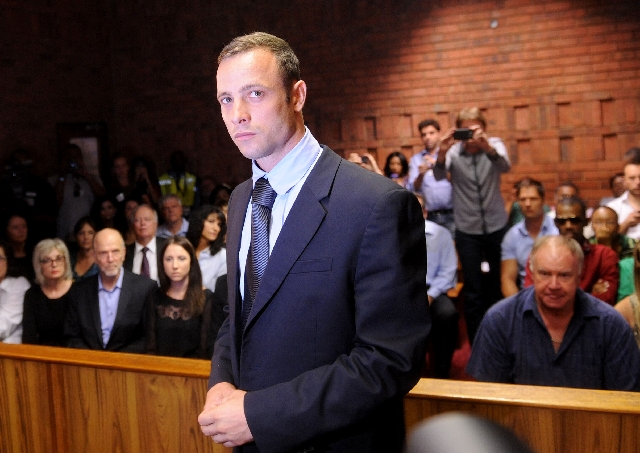Pistorius’ London glory a distant memory

I always will remember the 80,000 strong, rising and cheering and shaking Olympic Stadium to its foundation.
It was mesmerizing. Magical.
The heart won out with every carbon-fiber stride.
Oscar Pistorius was a symbol of something much bigger than an athlete running on fiber blades that summer morning in London.
His was the image that awakened amputees who might not believe they can live life to the fullest if their bodies aren’t whole, the most profound of inspirations, a Blade Runner who defined the Olympic and human spirit as much as anyone.
“I don’t know whether to cry or not,” Pistorius told a group of reporters that day after running a semifinal heat of the 400 meters. “I had a mixture of emotions. … It’s really mind-blowing. It was very difficult to separate the occasion from the race.
“I thought about my mom today. She was bit of a hard-core person. She always said a loser is not the person who gets involved and comes in last, but it’s the person who doesn’t get involved at all.”
Six months later, he is merely another fallen superstar, the latest example in a pattern of tragic storylines played out by those we admire most.
Pistorius was granted bail Friday in South Africa, where the first double amputee in history to compete against able-bodied athletes in an Olympics has been charged with murder in the shooting death of his girlfriend, Reeva Steenkamp.
And just when you thought there couldn’t possibly surface a bigger cad in sports than Lance Armstrong.
How ironic. Charles Barkley has emerged as the smartest man in the room. It’s getting tougher and tougher to discover any athletic role models worth a hoot. Someone needs to take the pedestal down for good. The fraud of it is too damn depressing.
A trial for Pistorius might not begin for up to a year given the backload of criminal cases pending. Murder charges in South Africa are like rain showers in Seattle, part of the daily fabric of things.
The (once) lead detective in the Pistorius case was found to have been facing seven attempted murder charges of his own.
They really keep themselves busy there in Cape Town.
There are holes in each side of the Pistorius case, in the athlete’s version of how he accidentally shot Steenkamp four times through a bathroom door after mistaking her for a home intruder and in the prosecution’s contention of a premeditated act.
There are fewer holes on the prosecution’s side.
There is also the fact that two boxes of testosterone and needles were discovered in the home. Could be nothing. Pistorius might have just been storing samples for Ryan Braun. Could be everything. Could be an act of roid rage.
There are no jury trials in criminal cases in South Africa, perhaps because they can’t find enough qualified people who aren’t also charged with violent crimes. But whatever the fallout and eventual decision of guilt or innocence by a judge, the tale of Pistorius again has reminded us how dangerous our desire is to create heroes among sporting stars.
We have forever pardoned the mistakes and failures of athletes with the ease of blogging. We are the planet of second chances.
But the more Armstrong lies to our faces for years on end, the more an athlete like Braun escapes penalty on flimsy technicalities, the more history chronicles such falls from grace as O.J. Simpson and Tiger Woods and Marion Jones and Michael Vick, wouldn’t you think it’s time we stop elevating athletes to levels of worship from which they are destined to tumble?
Sports reminds us that common people are capable of exceptional things, but it’s in those remarkable acts of athletic mastery that we often lose sight of the human element, of the inherent flaws we all possess.
I stood in that mixed zone of reporters and athletes six months ago in London, anxiously awaiting Pistorius to make his way through a mountain of interviews, interested and excited to write about his historic race.
“My mother said to us one morning, ‘Carl (his brother), you put on your shoes, and Oscar, you put on your prosthetic legs,’ and that was the last we heard of it,” he said that day. “I didn’t grow up thinking I had a disability. I grew up thinking I had different shoes.”
It’s easy to get caught up in such a story, to again believe in the human spirit that is so wonderfully illustrated through sports, to erect a pedestal that would fit perfectly two carbon-fiber blades.
Then a 29-year-old woman is shot dead while crouching in a bathroom late at night and the famous athlete accused of killing her tells a story that is less and less believable as the evidence surfaces.
And the sound of 80,000 rising and cheering doesn’t seem as loud, and the scene of it all not as mesmerizing or magical.
Las Vegas Review-Journal sports columnist Ed Graney can be reached at egraney@reviewjournal.com or 702-383-4618. He can be heard from 11 a.m. to 2 p.m. Monday through Friday on “Gridlock,” ESPN 1100 and 98.9 FM. Follow him on Twitter: @edgraney.